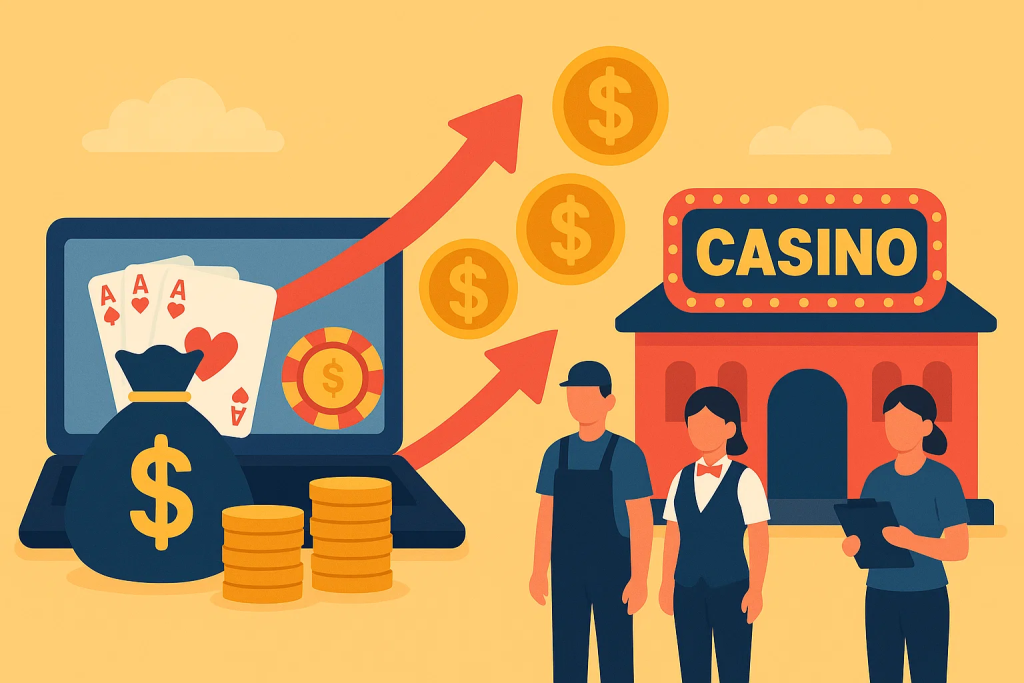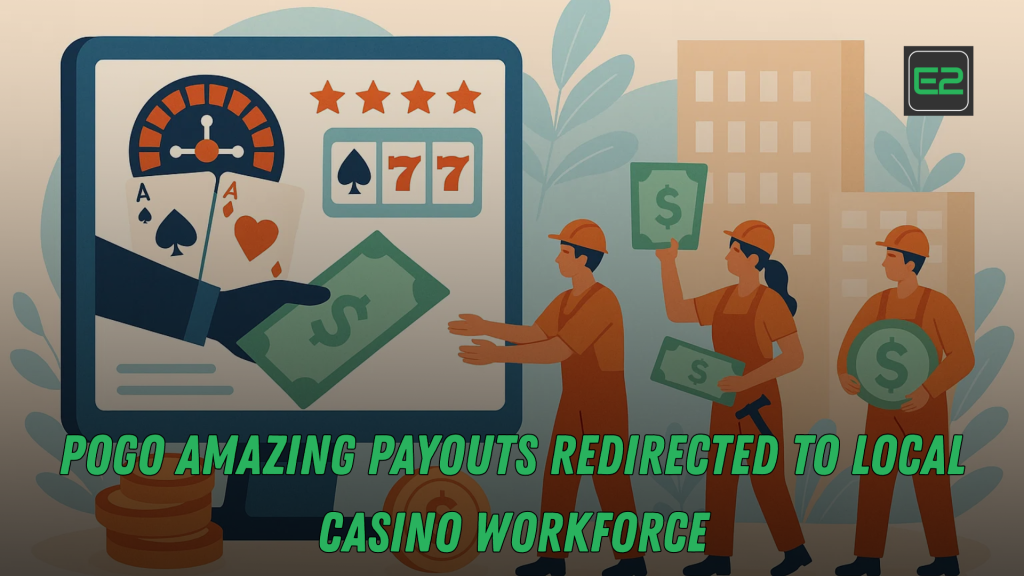Table of Contents
TL;DR (for busy execs and policymakers)
- The context: Philippine offshore gaming operators (POGOs)—rebranded as Internet Gaming Licensees (IGLs) in 2023—were ordered to wind down in 2024, disrupting tens of thousands of jobs and supplier ecosystems.
- The idea: Reallocate a portion of “amazing payouts” (jackpots, loss rebates, promo pools, VIP perks, and big-ticket marketing) to a Workforce Value Fund that directly raises front-line pay, skills, and stability—without undermining responsible-gaming safeguards.
- The upside: Better service outcomes, higher retention, compliance wins, and a measurable service-driven edge for land-based casinos as the market resets post-POGO.
- The plan: Start with a 10–20% redirect of promo/payout budgets into wages, tips-pool top-ups, skills stipends, and childcare/transport credits; measure Guest Service Score, Average Daily Rate per Customer (ADRC), and Employee Net Promoter Score (eNPS) monthly.
- The guardrails: AML/KYC first, ESG disclosures, responsible-gaming ring-fencing, third-party audits, and regulator-approved frameworks under PAGCOR’s evolving rules environment.

Why POGO matters now
The POGO era fueled jobs and vendor demand but also triggered complex law-enforcement, diplomatic, and reputational challenges. In July 2024, President Ferdinand Marcos Jr. announced a full ban and wind-down of POGO operations, with PAGCOR instructed to cancel licenses by year-end. Government agencies simultaneously flagged safety nets and upskilling for affected Filipino workers.
This shift does more than close a chapter; it rebalances how gaming-related value flows across the economy. With offshore-focused operations exiting and compliance tightening, there’s a unique opening for local casinos to stand out—not by racing to the richest giveaways, but by investing in people who deliver the guest experience every shift.
Quick primer: What POGOs were—and what changed
- POGO/IGL defined: Firms operating in the Philippines to offer online gambling to markets outside the country. In October 2023, “POGOs” were rebranded as Internet Gaming Licensees (IGLs).
- The crackdown: Authorities intensified enforcement against illegal operators tied to trafficking, kidnapping, scams, and other crimes—moves that culminated in an official ban and a wind-down directive in 2024.
- The human angle: Media estimates varied widely, but tens of thousands of workers—Filipino and foreign—were affected. One government-aligned figure cited roughly 40,000 Filipinos plus 23,000 foreign workers linked directly and indirectly to the sector. Separately, at least 20,000 foreign workers were told to depart post-ban.
Implication for local casinos: As offshore-oriented operations exit, land-based and fully regulated digital businesses can differentiate by embedding value where it lasts: pay, benefits, skills, and service quality.
The central strategy: POGO Rechannel “amazing payouts” into a Workforce Value Fund (WVF)
In gaming, “amazing payouts” are often shorthand for high-visibility rewards: jackpots, loss rebates, comped luxury perks, and splashy prize campaigns. These drive traffic—but they’re not the only lever for lifetime value. A portion of these outlays can be redirected into a Workforce Value Fund—a transparent pool used exclusively for front-line compensation and capability.
WVF goals
- Lift take-home pay (base + variable) for front-line roles where retention is mission-critical (dealers, cage & count teams, floor hosts, security, facilities).
- Professionalize skills via accredited training in game protection, AML awareness, guest recovery, and cross-selling—aligned with regulatory priorities.
- Reduce friction with practical benefits (childcare, late-night transport, meals, healthcare top-ups).
- Improve service metrics that correlate with gaming revenue and compliance quality.
Where the redirect comes from
- 10–20% of promotional budgets (e.g., prize draws, consumer gadgets)
- A small slice of jackpot reserve overages (subject to rules; never touch restricted funds)
- A portion of VIP marketing (gifts and lifestyle perks that have weak ROI attribution)
- Vendor co-op funds from beverages, snacks, and entertainment partners (with disclosure)
Important: Everything must stay within regulator-approved financial controls. Nothing here circumvents AML/KYC or responsible-gaming obligations; it should reinforce them.
What POGO casinos gain (beyond goodwill)
- Retention → consistency: High turnover kills service quality. A WVF tightens the loop between team stability and guest spend, improving Average Daily Rate per Customer (ADRC) and table utilization.
- Compliance uplift: Better paid, better trained staff are likelier to flag suspicious patterns, apply KYC rigor, and reduce loss from advantage play or collusion—outcomes regulators care about in the post-POGO landscape.
- Brand moat: In a market re-centering on domestic entertainment, a people-first posture is a defensible differentiator—harder to copy than a promo.
What workers gain (and why it’s strategic, not charity)
- Predictable, competitive pay aligned to skill tiers and multi-game proficiency
- Formal career paths: Dealer → Pit Supervisor → Floor Manager through stackable credentials
- Life-support benefits (transport, childcare credits) that turn attendance into a non-issue
- Recognition mechanics that reward quality, not just speed or handle
What regulators and communities gain
- A visible social compact: Redirecting headline-grabbing “payouts” into living wages and training shows the industry is investing in citizens, not just marketing optics.
- Alignment with the crackdown’s intent: As authorities shut down illegal or problematic operators, compliant casinos that uplift workers and tighten AML/KYC help stabilize the sector.
- Crime-prevention externalities: Stronger, more skilled staff are better at early detection and escalation, reducing risks linked historically to offshore operations.
Anatomy of a POGO Workforce Value Fund (WVF): Your 90-day blueprint
1) Define the pool (Week 0–2)
- Set an annual WVF target equal to 10–20% of last year’s promo/payout spend.
- Carve it into four buckets:
- Compensation uplift (45%)
- Training & credentials (25%)
- Benefits & stability (20%)
- Recognition & innovation (10%)
2) Lock the guardrails (Week 0–4)
- Regulatory pre-clearance: Map each use case to relevant PAGCOR rules; isolate funds from restricted prize pools as needed; document AML/KYC alignment.
- Independent oversight: Appoint a third-party auditor; publish a plain-language WVF report quarterly.
- Responsible-gaming ring-fence: WVF may never be funded by budgets reserved for RG interventions.
3) Launch compensation enhancements (Week 3–6)
- Raise base pay bands for high-turnover roles.
- Introduce shift premiums for late/holiday work.
- Implement a service-quality bonus tied to mystery shop and GSS thresholds, not just volume.
4) Stand up training that pays (Week 4–10)
- Deliver certified modules: guest recovery, table integrity, dispute de-escalation, AML spotting.
- Fund exam fees; promote graduates publicly (name badges with skill tiers).
- Require refreshers every 6–12 months.
5) Practical benefits that remove friction (Week 6–12)
- Partner with ride-hailing for safe late-night trips.
- Offer childcare credits or on-site arrangements on weekends.
- Provide healthcare top-ups and mental-health access.
6) Recognition & innovation (ongoing)
- Monthly Service Stars with taxable cash awards.
- Idea bounties: pay for verified improvements (reduced drop variances, faster queue times, higher RG compliance completion).
- Wall-of-Fame dashboards in backstage areas.
Tracking what matters: The WVF scorecard
- Guest Service Score (GSS) – target +8–12 pts in 6 months
- eNPS – target +20 uplift by quarter 2
- First-year turnover – cut by 25–35%
- RG & AML training completion – sustain at 98–100%
- ADRC & time-on-device – correlate with GSS movement (watch for RG red lines)
- Incidents detected & resolved – track as positive compliance outcomes (not “bad news”)
Will redirecting payouts hurt marketing? Not if you reframe value.
A guest who wins a flashy gadget once may post on social—but every guest benefits when lines are shorter, tables run smoother, and staff resolve issues on the first try. That’s real, compounding value.
Replace some low-ROI prize inventory with:
- “Service Guarantee” moments (instant comp for mishaps, in-the-moment recovery)
- Experience perks (priority seating, personal dealer mini-lessons)
- Community nights that showcase staff skills and local talent
You’re not reducing value—you’re shifting it to something stickier.
POGO Compliance, risk, and reputation: Lessons from the crackdown
The enforcement arc that culminated in the 2024 ban highlighted the stakes: human trafficking, kidnapping, and financial crimes linked to illegal offshore gambling operations. Reputable venues cannot afford leaky processes or cosmetic compliance.
What to operationalize now:
- End-to-end KYC on loyalty enrollment, cash handling, and cage operations
- Suspicious activity escalation flows with time-stamped handoffs
- Table game protection refreshers (shuffle audits, collusion cues, fill/credit discipline)
- Vendor & VIP due diligence beyond crests and letterheads
Reality check: After the ban/wind-down, analysts warned of rebranding attempts and displacement of bad actors. Your advantage is to be over-transparent and over-trained.
A realistic financial model (illustrative)
Assume a mid-size property with ₱250M annual promo/payout budget:
- Redirect 15% → ₱37.5M WVF
- ₱16.9M (45%) to compensation uplifts → +₱2,000/month for 700 front-liners
- ₱9.4M (25%) to training & credentials → 1,400 course seats + assessment fees
- ₱7.5M (20%) to transport/childcare/health top-ups
- ₱3.7M (10%) to recognition & innovation bounties
Expected returns within 6–12 months (directional):
- 25–35% lower first-year attrition saves millions in recruiting and training churn
- +8–12pt GSS correlates to improved ADRC and longer dwell times (watch RG guardrails)
- Fewer drop discrepancies and stronger incident reporting reduce compliance risk exposure
People stories: What changes on the floor
- Dealers with cross-game certifications move up bands faster and earn dependable premiums.
- Hosts trained in guest recovery turn “near misses” into repeat visits.
- Security with de-escalation training prevents incidents before they happen.
- Cage teams with AML refreshers flag irregularities early—protecting the brand and license.

Integrating with public safety nets and retraining schemes
Government statements around the POGO wind-down referenced safety nets and retraining for displaced Filipino workers. Casinos can co-fund slots in hospitality, IT, surveillance analytics, and compliance operations—bridging workers from adjacent industries into regulated gaming roles.
Tactical approaches:
- Joint scholarships with state colleges for surveillance & AML analyst tracks
- Credit recognition for prior call-center or fintech KYC experience
- Returnships for caregivers re-entering the workforce with flexible schedules
Communicating the pivot (so it actually lands)
- Internal first: All-hands, Q&A roadshows, and transparent calculators (“how WVF affects my pay”)
- Customers second: “People-Powered Gaming” brand line, in-venue signage, and app notices
- Regulators & media: Quarterly WVF reports with audited figures and outcome metrics
- Community: Hiring fairs, certification graduations, and scholarship award days
Common objections—and how to answer them
“Won’t fewer promos cut traffic?”
Not if you replace them with better experiences. Guests return for smooth play and trusted staff. Measure and iterate.
“Isn’t this expensive?”
You’re already spending the money. You’re just moving pesos from short-lived sizzle to compounding capability.
“Will this conflict with responsible-gaming?”
No. WVF must be ring-fenced from RG funds and should enhance RG outcomes by training staff better.
“What if bad actors rebrand and creep back in?”
Your transparency + training + audit model is the moat. Stay aligned with regulators and keep publishing the numbers.
The 12-month roadmap (milestones you can ship)
- Month 1–2: WVF policy, regulator pre-read, audit engagement
- Month 3: Pay bands live; shift premiums begin
- Month 4: First two training cohorts graduate (table integrity + AML)
- Month 5: Transport & childcare benefits start
- Month 6: First WVF public report; publish GSS/eNPS baselines
- Month 9: 10% lift in multi-game certifications; +6pt GSS
- Month 12: Attrition down 25–35%; second WVF report released
Responsible-gaming and AML controls: Non-negotiables
- RG signage and staff scripts in key areas; anonymous help channels
- KYC refresh cadence; PEP/sanctions screening; escalation SLAs
- Data discipline: table fills/credits, variance reviews, and incident logs
- Third-party audits with published summaries—build public trust that post-POGO gaming is clean and community-oriented.
The bigger picture: From “payouts” to prosperity
The ban and wind-down of POGOs pushed the industry to rethink what value really is. If the last decade was defined by big promos and offshore revenue flows, the next one can be defined by professionalized local work, safer venues, and service that keeps guests coming back.
By redirecting even a slice of those “amazing payouts” into people, you secure your brand’s license to operate and build a service moat that rivals can’t out-discount.
Strong call-to-action
Ready to turn payouts into people power?
- Operators: Let’s map your current promo spend to a WVF pilot and forecast ROI in 60 minutes.
- HR/Training leads: Ask for the Certification Menu and a cohort calendar you can deploy next month.
- Regulators & LGUs: Request the WVF Compliance Pack with ring-fencing templates and audit checklists.
Final Word
POGOs—rebranded as Internet Gaming Licensees—were ordered to wind down in 2024, disrupting tens of thousands of jobs and resetting the Philippine gaming landscape. The article proposes a practical pivot for land-based casinos: redirect a portion of “amazing payouts” (jackpots, rebates, flashy promos) into a Workforce Value Fund (WVF) that boosts local jobs, skills, and compliance.

The WVF reallocates 10–20% of promo/payout budgets into four buckets: (1) compensation uplifts and shift premiums for frontline roles; (2) accredited training in guest recovery, game protection, AML/KYC, and responsible gaming; (3) friction-reducing benefits like late-night transport, childcare credits, and healthcare top-ups; and (4) recognition and idea bounties. A 90-day rollout covers fund sizing, regulator pre-clearance and ring-fencing, pay band launches, training cohorts, and benefits activation.
Expected wins: lower turnover, stronger service, tighter compliance, and a durable brand moat built on people—not giveaways. Key metrics include Guest Service Score, eNPS, first-year attrition, ADRC, RG/AML completion, and incident detection quality. An illustrative model redirects ₱37.5M from a ₱250M promo budget, funding pay, courses, benefits, and rewards.
Bottom line: shift some sizzle to substance. By investing promo pesos in people, casinos create safer venues, happier guests, and sustainable, community-rooted growth.
Frequently Asked Questions
1) What exactly were POGOs, and why did they wind down?
2) How does redirecting “amazing payouts” help the local workforce?
A dedicated Workforce Value Fund channels a portion of promo/payout budgets into pay, skills, and benefits, improving retention and service quality. That drives recurring revenue more reliably than one-off giveaways, while supporting a safer, better-regulated market.
3) Will this clash with responsible-gaming rules?
4) Are there real numbers on jobs affected by the POGO exit?
Estimates vary. Reporting tied to the wind-down cited tens of thousands of roles, including figures like ~40,000 Filipinos and ~23,000 foreign workers linked to the sector; other coverage noted ~20,000 foreign workers instructed to leave. Exact counts differ by source and timeframe, but the disruption was large.
5) How do we explain this shift to guests who love big promos?
Reframe value: fast queues, friendly expertise, and fair play—delivered by well-paid, well-trained staff—beat gadget giveaways. Keep a smarter, smaller promo calendar while showcasing your people story. Over time, service quality becomes your brand moat.
